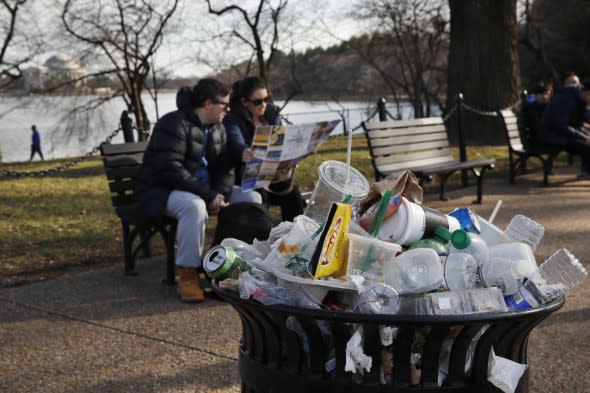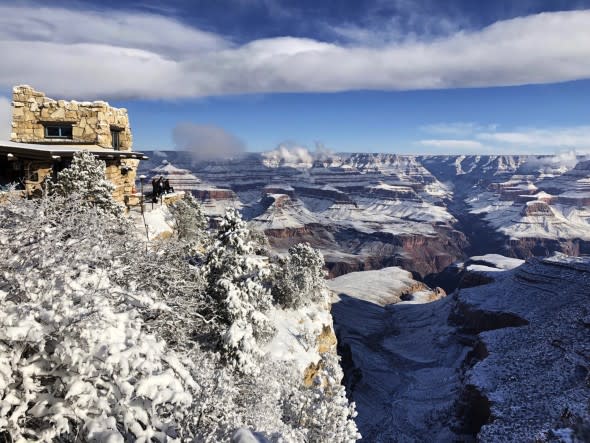National parks forced to close, hazards mount at others amid government shutdown
Heavy snowfall in parts of the southwestern United States over the past week resulted in the closure of Canyonlands and Arches national parks in southeastern Utah.
The closure was made for public safety reasons as plowing services at the parks are unable to be provided due to the ongoing partial government shutdown, which is approaching its second full week, according to statements from park officials on Twitter.
Arches National Park officials said on Dec. 22, the day the shutdown began, that some parts of the park would remain accessible; however, access may change without notice.

A trash can overflows as people site outside of the Martin Luther King Jr. Memorial by the Tidal Basin, Thursday, Dec. 27, 2018, in Washington, during a partial government shutdown. (AP Photo/Jacquelyn Martin)
"It is unknown how long the road will be closed," park officials said on New Year's Eve. "Access to the park will not occur until the snow and ice melts or until the National Park Service receives funding to continue plowing operations."
"We are not able to monitor social media accounts," the tweet read.
It is unknown how long the road will be closed. Access to the park will not occur until the snow and ice melts or until the National Park Service receives funding to continue plowing operations.
We are not able to monitor social media accounts. More info: https://t.co/RABThdzvAf— Arches National Park (@ArchesNPS) December 31, 2018
Identical tweets were sent from the Canyonlands' Twitter account.
According to a contingency plan on the park system's website, if visitor access becomes a safety, health or resource protection issue due to weather, road conditions or various other issues, then the area must be closed. Parks are not allowed to bring on additional staff to accommodate access, according to the plan.
Health hazards have also become an issue due to unchecked public sanitation in some parks and have led to several closures.
The Associated Press reported that human feces, overflowing garbage and illegal off-roading were beginning to overwhelm some sites. The buildup of garbage has prompted concerns for the welfare of wildlife.
During the shutdown, park-provided services such as bathrooms are closed, and there is no trash collection or road maintenance at the parks.
"We're afraid that we're going to start seeing significant damage to the natural resources in parks and potentially to historic and other cultural artifacts," John Garder, senior budget director of the nonprofit National Parks Conservation Association told the AP. "We're concerned there'll be impacts to visitors' safety."
"It's really a nightmare scenario," Garder said.
In some locations, such as Joshua Tree National Park and Yellowstone National Park, volunteer groups and private companies have worked to clean up the accumulation of trash.
Joshua Tree park officials said that all campgrounds would close at noon on Jan. 2 due to health and safety concerns as vault toilets reach capacity.

This Tuesday, Jan. 1, 2019, photo shows Lookout Studio in Grand Canyon Village on the South Rim of Grand Canyon National Park in Arizona. While parts of the national park were closed due to the partial government shutdown, much of the park's South Rim was open and accessible. (AP Photo/Anna Johnson)
In addition to human waste in public areas, driving off road and other infractions, such as illegal camping, that damage natural resources are becoming a problem.
"I want to extend a sincere thanks to local businesses, volunteer groups, and tribal members who have done their best to assist in picking up litter and helping maintain campgrounds," park superintendent David Smith said in a statement. "This is no reflection on their efforts and the park is very fortunate to have a community that exhibits the kind of care and concern witnessed over the last week."
Smith added that most visitors have been respectful to the park and the facilities.
Also on Jan. 2, Seqouia and Kings Canyon National Parks announced they were closing due to health and safety concerns. The closure was likely to remain effect for the full duration of the shutdown.
Sequoia and Kings Canyon National Parks will be fully closed effective 6 p.m. on Wednesday, January 2. The parks are being forced to take this action for health and safety concerns. This supersedes previous closures.
— Sequoia & Kings Cyn (@SequoiaKingsNPS) January 3, 2019

